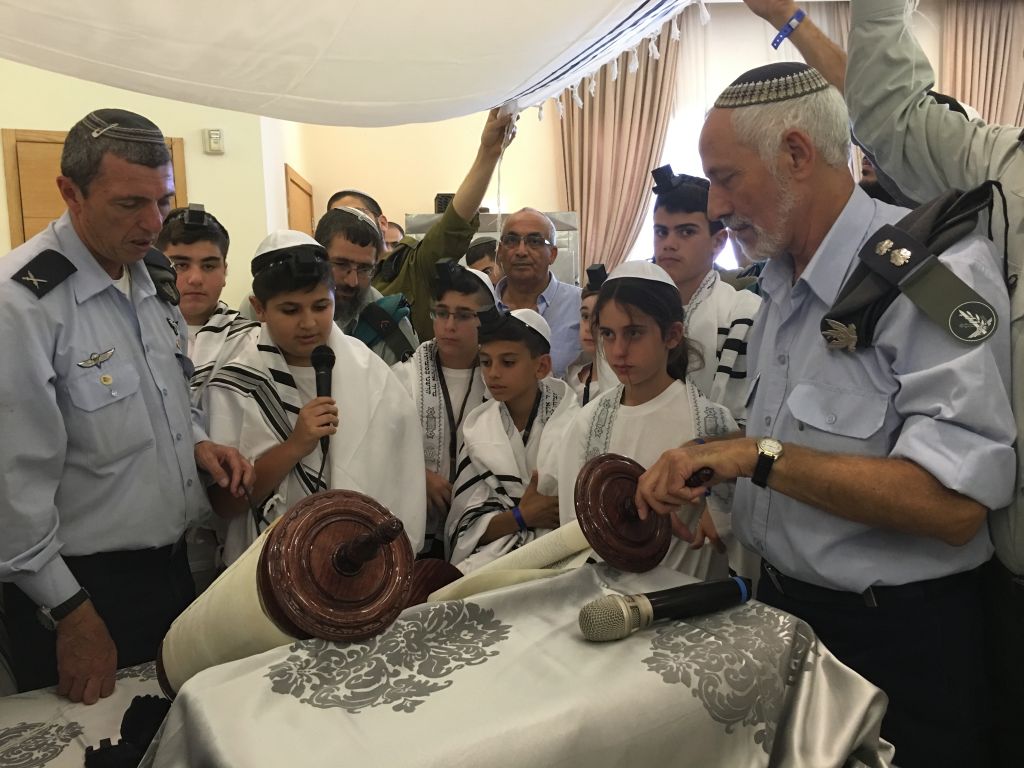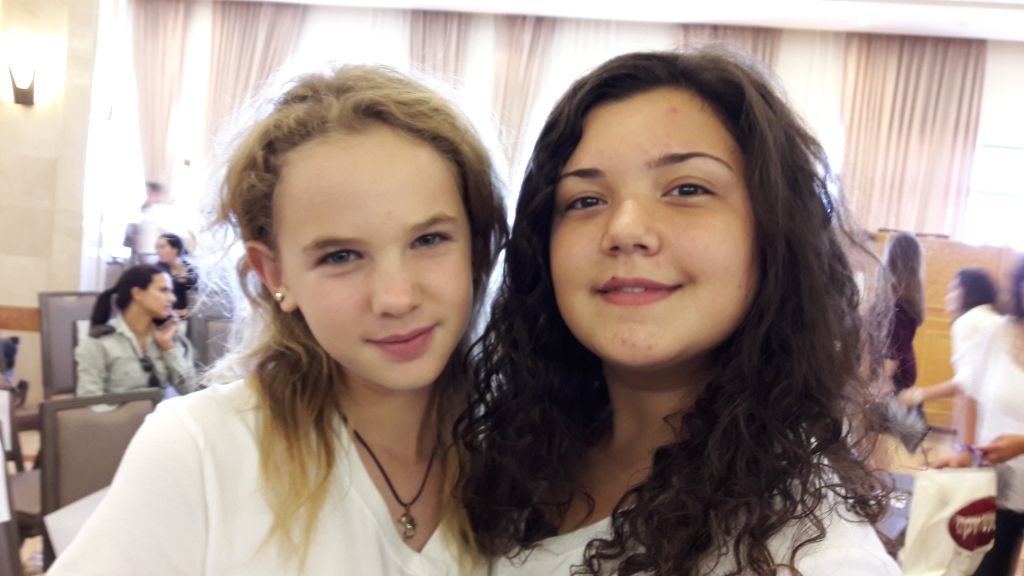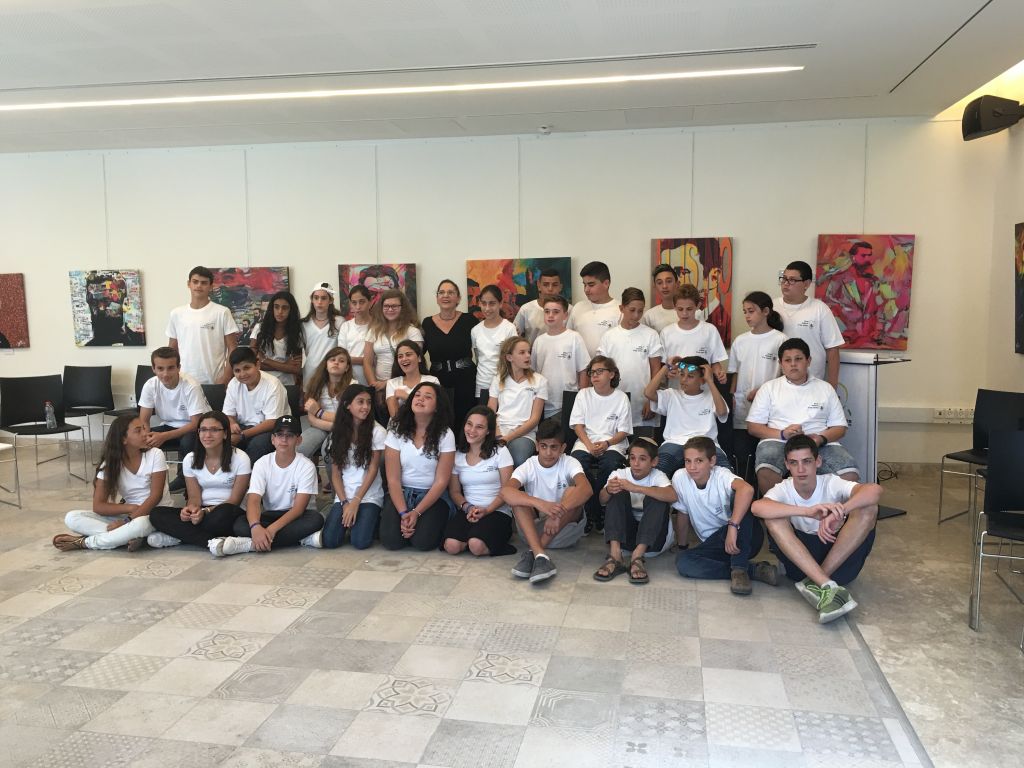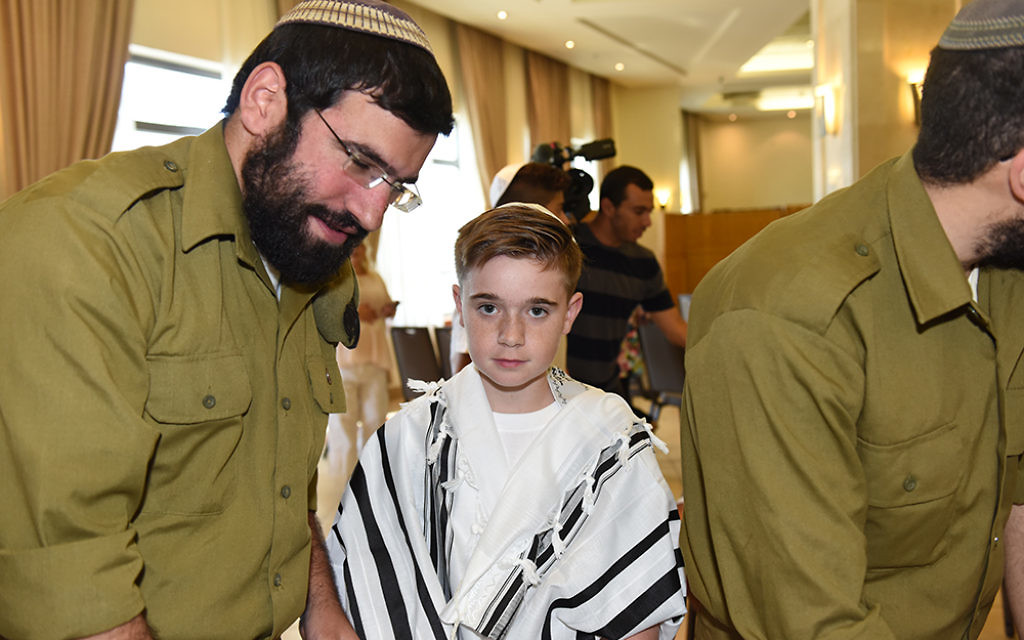How IDF orphans celebrate their bar and batmitzvahs
Coming of age is a rite of passage for every Jewish youngster, including the 3,000 young IDF orphans
I have come to Bayit Ve Gan, an ultra-Orthodox Jerusalem suburb. Last-minute preparations for the Succot holiday are underway; men in dark trousers and white shirts bustle past carrying lulavs. The sound of hammering succahs competes with traffic noise. Toddlers blink against the bright sun, bounced along in rickety buggies by mothers in a hurry.
But in the low-ceilinged conference room, girls in colourful miniskirts and boys in skinny jeans and spiky haircuts are dancing together in an impromptu hug circle as music blares.
These kids are wearing pristine white t-shirts emblazoned with huge blue numbers on the back – “12” for the girls, “13” for the boys.
Get The Jewish News Daily Edition by email and never miss our top stories Free Sign Up
Their mothers, grandmothers and siblings look on and smile; a few quickly swipe away tears with the back of a hand.
This is the bar and batmitzvah celebration for the IDF Widows and Orphans Organisation, a non-profit that looks after the welfare of some five thousand Israeli widows whose husbands were killed while serving in the military or the police.
Currently around three thousand children are growing up in Israel as IDF orphans.
“One of the things we do is to be present at important junctions in their lives,” Shlomi Nachumson, the organisation’s Youth Director, tells me. A genial bear-like man, his bearded face splits into a huge grin as soon as he talks to the kids.

“For example,” he continues, “the start of kitah aleph [first grade in school]. All these milestones on the journey to adulthood. At this point the key person in their lives is missing. I think of my barmitzvah, I remember my father’s hand on my shoulder and that’s an important thing. We can’t bring their father back. But we can tell them that they’re not growing up by themselves. They’re with the presence of the tribe.”
I can sense Shlomi’s impatience even while he’s politely answering my questions. When I release him he rushes off and before long he is picking up the kids and hoisting them up in the air. He and the volunteer youth workers, most of them IDF orphans themselves, have a solid rapport with the kids. Four times a year they hold special activities – day camps, outings – and in the bar/batmitzvah year, a three-and-a-half week trip to the US and Canada, where they visit different cities and communities, stay with families and, from the sound of things, have a thoroughly good time.
“The trip was magniv,” Shira Cohen, 12, tells me, using the ubiquitous Hebrew word for all things cool. Shira is Jewish, from Binyamina, near Zichron Yaakov, and her friend, Asoul Nasreluden, is from the Druze community of Dalyat el Carmel. It is clear that these two are best friends. And it’s a stark reminder that among the IDF’s fallen soldiers are those from the Druze and other communities within Israel.

“They have these friendships for life,” Shlomi says. “People who know exactly how they feel without having to explain. They can process grief in many ways and it’s legitimate.”
Joining the Israeli children is Andrew Voelke, a Jewish boy from Springfield, Virginia, whose father served in the US armed forces and was killed in Afghanistan. Andrew met the Israeli kids in the summer and was invited to be part of the celebrations in Israel. Andrew, like all the barmitzvah celebrants, is presented with a set of tefillin. The girls get Jewish books and Shabbat candlesticks. The non-Jewish children are presented with books which relate to their religion. This is a well-organised outfit, and it’s clear that pains have been taken for everything to go off smoothly.
Standing beside me is Iris Segev, from Ramat Gan. “That’s him, there, in the front, that’s Omer,” she points her son out proudly. “He’s so much like his dad. He has his father’s two dimples, his great sense of humour. His father was gorgeous.”
Nimrod, her husband, was killed in the Second Lebanon War, when Omer was only two years old. “The ninth of August 2006. He was only twenty-eight.” Then she tells me that the trip to the States was the best thing ever, as far as Omer is concerned. “He came back all grown up.” I ask her if they’re celebrating Omer’s barmitzvah privately as well. “Oh yes,” she says. “We’re having a call-up this Shabbat, in our shul.”

Multi-coloured toffees are thrown, giant shofars are blown, drums crash and we form a procession into a tiny adjoining synagogue. Here the boys will put on their tefillin for the first time. There is much joking and laughing around the bima. A clarinet blares out Shalom Aleichem.
Beside me, Ros Ohayon from Nazareth Illit is chatting with the other mothers. They discuss who will compile the photos and video clips from the Summer trip so that they can all share them. “Mazal tov”, I wish her. And she thanks me, and tells me about her husband Hanan, who was killed in December 2010 while serving in the intelligence corps, caught in the deadly Carmel Forest fire disaster which claimed 44 lives. Their son, Segev, was then six years old.
“His dad was a hero. He went to rescue people.”
“Does Segev take after his dad?”
“Absolutely. Even in the way he jumps out of bed in the morning with so much energy. Like, tak, he’s awake. He always tells everyone, Mum’s so strong. She always chooses life. That’s what he tells people. And life is the most precious thing. I tell the kids that. I’m always positive in front of them,” she says.
“Is that a struggle?” I ask, because it seems the only thing to ask, really.
She looks at me and nods. “It’s a huge struggle. Every day, it’s a struggle.”

Thank you for helping to make Jewish News the leading source of news and opinion for the UK Jewish community. Today we're asking for your invaluable help to continue putting our community first in everything we do.
For as little as £5 a month you can help sustain the vital work we do in celebrating and standing up for Jewish life in Britain.
Jewish News holds our community together and keeps us connected. Like a synagogue, it’s where people turn to feel part of something bigger. It also proudly shows the rest of Britain the vibrancy and rich culture of modern Jewish life.
You can make a quick and easy one-off or monthly contribution of £5, £10, £20 or any other sum you’re comfortable with.
100% of your donation will help us continue celebrating our community, in all its dynamic diversity...
Engaging
Being a community platform means so much more than producing a newspaper and website. One of our proudest roles is media partnering with our invaluable charities to amplify the outstanding work they do to help us all.
Celebrating
There’s no shortage of oys in the world but Jewish News takes every opportunity to celebrate the joys too, through projects like Night of Heroes, 40 Under 40 and other compelling countdowns that make the community kvell with pride.
Pioneering
In the first collaboration between media outlets from different faiths, Jewish News worked with British Muslim TV and Church Times to produce a list of young activists leading the way on interfaith understanding.
Campaigning
Royal Mail issued a stamp honouring Holocaust hero Sir Nicholas Winton after a Jewish News campaign attracted more than 100,000 backers. Jewish Newsalso produces special editions of the paper highlighting pressing issues including mental health and Holocaust remembrance.
Easy access
In an age when news is readily accessible, Jewish News provides high-quality content free online and offline, removing any financial barriers to connecting people.
Voice of our community to wider society
The Jewish News team regularly appears on TV, radio and on the pages of the national press to comment on stories about the Jewish community. Easy access to the paper on the streets of London also means Jewish News provides an invaluable window into the community for the country at large.
We hope you agree all this is worth preserving.
-
By Brigit Grant
-
By Laurent Vaughan - Senior Associate (Bishop & Sewell Solicitors)
-
By Laurent Vaughan - Senior Associate (Bishop & Sewell Solicitors)
-
By Laurent Vaughan - Senior Associate (Bishop & Sewell Solicitors)
-
By Laurent Vaughan - Senior Associate (Bishop & Sewell Solicitors)






















